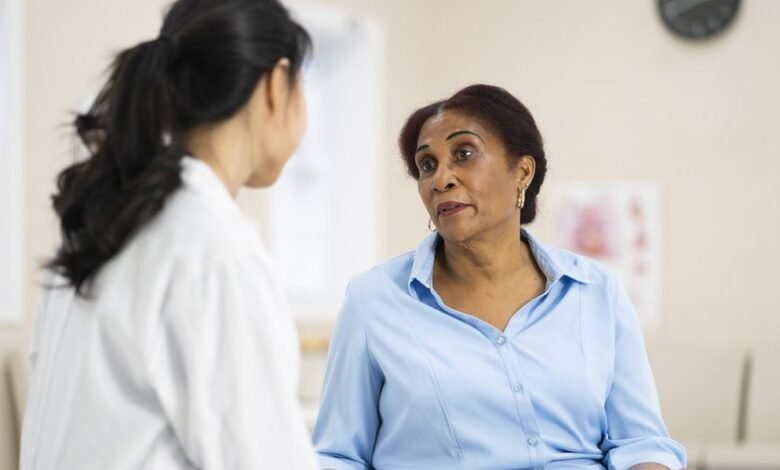Women’s Health Concerns Are Often Dismissed

Christine Topham nearly died while giving birth when she was 33 years old. She needed an emergency hysterectomy, but her healthcare provider (HCP) never fully explained the seriousness of the surgery to her.
“Before I could even get my head around what it would mean to have no uterus, the doctor said to me, ‘Don’t worry — your husband won’t notice any difference,’” said Topham, now 65.
The HCP seemed more concerned with her husband’s sexual experience than the physical and emotional toll Topham was facing, especially with the sudden loss of her fertility.
Mashon Thomas, 38, had opposite fertility goals but a similar experience. At age 25, Thomas knew she didn’t want to have children and asked an HCP about permanent birth control options.
“Instead of being given my options as an adult — old enough to drink, smoke, vote and go off to war — I was flat out told by a male doctor that any permanent options were unavailable for me,” she said.
Thomas’ HCP assumed she would change her mind.
“I was asked to think about ‘What if I met a man who wanted kids?’” she said. “As if I couldn’t make my own decisions with my own body.”
Dismissing women’s concerns is not a new problem, said Tiffany Smith Gishizky, PMHNP, psychiatric nurse practitioner at Mindpath Health.
“For centuries, women who reported symptoms were told they were being hysterical,” she said. “Unfortunately, this problem persists today, with women being told that their symptoms are ‘all in your head’ or due to hormonal variations, resulting in genuine and potentially severe conditions being overlooked or delayed.”
The consequences can be dire. A 2018 study showed that more than 5 out of 10 of women who went to the hospital with a heart attack reported that their HCP didn’t see their symptoms as heart-related, compared with less than 4 out of 10 of men.
That was the case for Kelly Shoul, 34. She was sent home from the emergency room (ER) despite severe stomach pain, which the ER doctor said was heartburn. Nine days later, Shoul returned with a fever. Her appendix had burst and she needed to have emergency surgery and part of her bowel removed.
“I now have a very hard time trusting myself and knowing when I should seek care,” Shoul said. “I also have a hard time trusting doctors now. Also, it has left me permanently susceptible to [gastrointestinal] GI issues. It’s awful.”
Shoul’s experience may be the result of common misperceptions about women that lead HCPs to take their pain less seriously.
“The longstanding and misguided belief that women are excessively emotional is one reason why the healthcare industry has a record of invalidating and disregarding women’s concerns even today,” said Judith Leitich, FNP, nurse practitioner and medical director at Bespoke Treatment. “The belief that women are weak has wrongly rationalized that their troubles are inflated and their reactions are exaggerated. This historically led to a tendency for healthcare professionals to attribute women’s grievances to psychological issues or emotional upset instead of treating them as legitimate medical issues.”
There are more practical causes as well, according to Barb Dehn, R.N., nurse practitioner and a member of HealthyWomen’s Women’s Health Advisory Council. “I don’t think any healthcare provider goes into the profession thinking they will dismiss or minimize their patients,” she said.
But, Dehn said, many HCPs have just 15 to 20 minutes with each patient, not enough time for in-depth interactions — and listening takes time.
Lack of diversity in research and training hurts women
A lack of data on women’s health is another factor that may lead HCPs to dismiss women’s symptoms.
“Most medical research and training is on men,” Gishizky said. “Society is just now shifting the focus to include sex and gender studies, and that a ‘one-size-fits-all’ database is inadequate.”
Lack of diversity in clinical trials also extends to race, which may help explain extensive evidence that women of color are often less likely than others to be diagnosed with or treated for legitimate medical conditions.
Read: The Cost of Racial Bias in OB-GYN Care >>
A recent survey from the Pew Research Center found that 71% of Black women ages 18 to 49 said they have had at least one bad healthcare experience, such as feeling an HCP didn’t take their pain or women’s health concerns seriously, compared to 58% of all adults.
“It’s no secret that women of color endure greater hardship as they encounter combined prejudices and unfair treatment because of who they are,” Leitich said. “The [lack of access] to high-quality healthcare facilities, elevated rates of maternal death, reduced rates of preventive care and exceptional health complications related to their ethnicity escalate the likelihood of insufficient medical care, leading to more erroneous diagnoses.”
Dehn said that HCPs’ own biases and lack of cultural understanding can also get in the way.
“It’s not just about reading the literature when it comes to the most common types of symptoms reported,” she said. “It’s also about understanding the different ways people narrate their illnesses.”
Leitich said improving the healthcare system starts with more diversity in leadership roles. We also need more support for women’s health conditions and resources to address the health disparities among women of color.
What to do if your doctor dismisses you
If you don’t feel like you’re being heard or taken seriously, it’s important to know that you can advocate for yourself. That can be easier said than done, especially if your doctor ignores your pain or can’t diagnose you. But experts urge women to take charge of their health.
“It is important to trust your instincts,” Gishizky said. “If you feel something is wrong and you’re not being heard, speak up. Be persistent. If you still feel dismissed, find a new provider or a second opinion.”
As a younger woman, Thomas didn’t fully understand or know how to exercise her rights, but her early negative healthcare experience still influences her today.
“I’ve learned and grown from that experience — although it took me years — that I must always stand up for what I believe no matter what a doctor tells me,” she said. “Medical providers can do wonders, but we must also do our part in pushing back and gathering multiple opinions and options.”
From Your Site Articles
Related Articles Around the Web
Source link
#Womens #Health #Concerns #Dismissed



